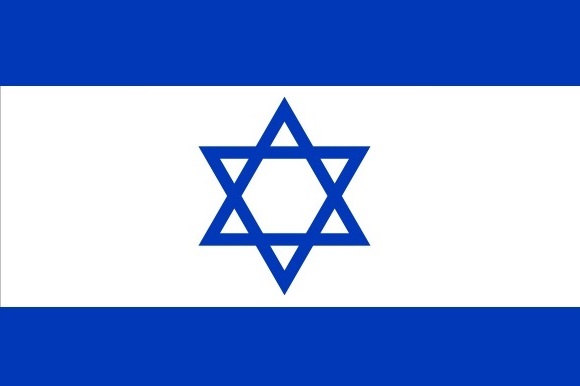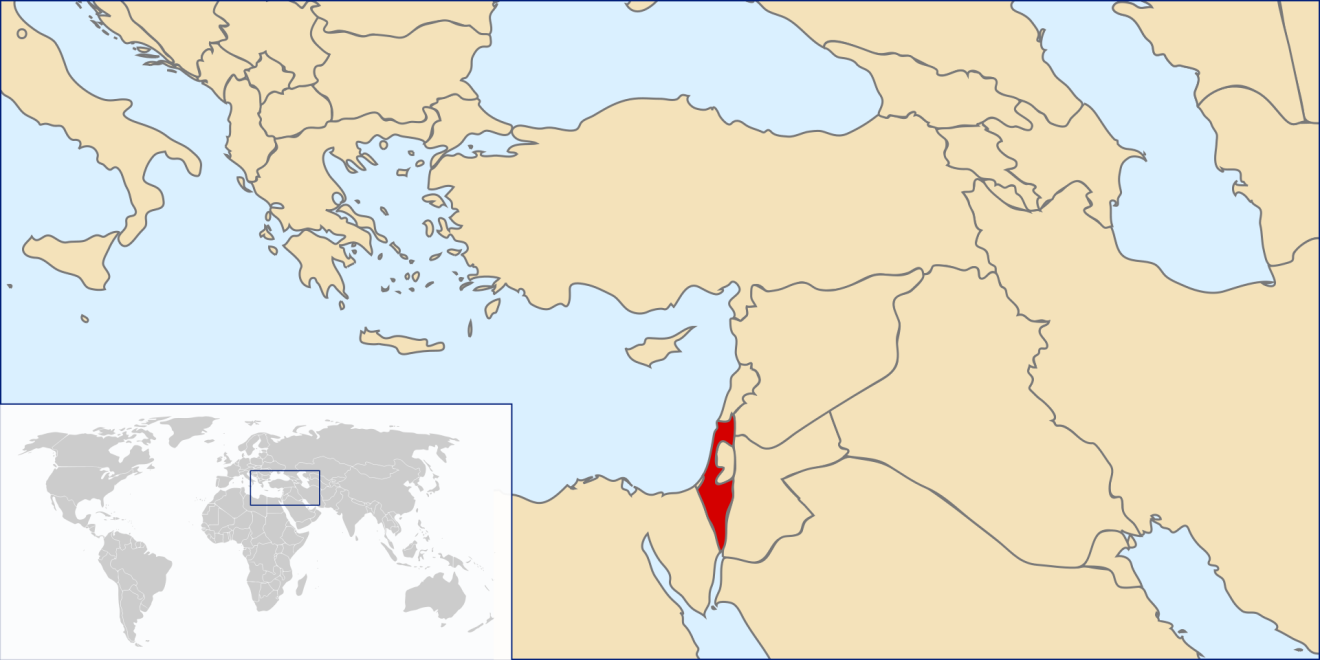
Geography

Source: This image is the intellectual property of Rei-artur. Redistribution under licence CC BY-SA 3.0
Area: 20,770 km2 (2,12% water)
Coastline: 273 km
Terrain: Desert to the south, coastal plain, mountains to the north and center of the country, the Jordan Valley covers part of the eastern border
Highest point: Mount Meron 1,208 m (in northern Israel)
Climate: Generally mild, hot and dry in the desert
Geographical population distribution: About 60% of the population is concentrated in metropolitan Tel-Aviv and Jerusalem. The majority of the rest of the population resides in the country’s northern district and the Haifa district.
Natural resources: natural gas, potash, copper ore, phosphate rock, magnesium bromide, clays, sand
Demographics
Population: ~9,921,000 (2025)
Annual population growth: ~2.47% (2025)
Estimated population in 2025: ~9,921,000
Age structure (2025)
0‑14 years – ~28%
15‑64 years – ~60%
65+ years – ~12%
Total fertility rate (children per woman): ~2.87 (2025 est.)
Birth rate: ~18.41 per 1,000 people (2025)
Death rate: ~5.31 per 1,000 people (2025)
Median age: ~29.7 years (2025)
Life expectancy at birth: ~83.79 years (2025)
Males – ~82.44 years
Females – ~85.20 years
Net migration rate: (not specified recent estimate)
Languages: Hebrew (official), Arabic, other widely spoken languages
Religious groups: Jews ~70.7%, Muslims (mainly Sunni) ~18.5%, Christians ~3.0%, Unaffiliated/Atheist ~4.9%, Others ~2.9%
Ethnic groups: Jews ~76.3%, Arabs ~20.1%, Others ~3.6%
Economy
GDP: $407.10 bil (2020)
GDP per capita: $44,168.9 (2020)
GDP annual growth rate: -2.2% (2020)
Public debt (% GDP): 61.0% (2018)
Inflation (CPI): -0.6% (2020)
Unemployment: 4.6% (2020) Imports: $76,6 bil (2019)5 largest import partners (% total imports - 2019): United States 16.75%, China 13.37%, Bunkers 10.16%, Germany 6.31%, Turkey 5.22%
Exports: $58.5 bil (2019)5 largest export partners (% total exports - 2019): United States 27.29%, United Kingdom 8.54%, China 7.56%, Bunkers 6.88%, Hong Kong, China 5.20%
Global Competitiveness Report (World Economic Forum)
76.7/100 (2019 – position 20/141)
Index of Economic Freedom (Heritage Foundation)73.8/100 (2021 – position 26/180)
Income Inequality Index (Gini – World Bank)38.9% (2016)
Prosperity Index (Legatum Institute)78.98/100 (2021 – position 32/167)
Military Power
Active personnel: 173,000 (2021)Ground Forces: 130,000
Naval: 9,000
Airforce: 34,000 Defence expenditure (%GDP): 4.3% (2018)
Politics and Government
Form of government: Parliamentary democracy
President: Isaac Herzog (2021)Prime Minister: Benjamin Netanyahu (since December 2022)
Executive branch: The President is the head of state but his role is symbolic and customary and the Prime Minister is the head of the executive and of the government. The Prime Minister is elected for a 4-year term and there are currently no term limits. The composition of government and the Prime Minister himself are approved by the Parliament.
Legislative branch: The Knesset is Israel’s parliament and it exercises legislative authority. It is comprised of 120 members which are elected directly by the citizens for a 4-year term.
Judicial branch: The justice system consists of the Magistrates’ Courts (first instance courts), the District Courts (courts of appeal), and the Supreme Court. Judges are appointed by the Judicial Selection Committee which consists of 9 members: 3 judges from the Supreme Court, 2 cabinet ministers (including the Minister of Justice), 2 members of Knesset and 2 representatives of the Israel Bar Association. The country has religious, labour, administrative, military and other special courts.
Parliamentary parties (seats): Likud (36), Blue and White (33) Joint List (15), Shas (9), Yisrael Beiteinu (7), United Torah Judaism (7), Yemina (6), Labour-Gesher-Meretz (7)
Last elections: Parliamentary elections 2020 – Likud 29.46%, Blue and White 26.59%, Joint List 12.67%, Shas 7.69, United Torah Judaism 5.98%, Labour-Gesher-Meretz 5.83%, Yisrael Beiteinu 5.74%, Yemina 5.24%. Voter turnout was 71.52%.Next elections: Municipal elections 2023
Rule of Law - Human Rights
Corruption Perceptions Index (Transparency International)60/100 (2020 - position 35/180)
Rule of Law Index (World Justice Project)
-
Global Terrorism Index (Institute for Economics & Peace)
4.525/10 (2019 – position 40/163)
Fragile States Index (Fund For Peace)
43/120 (2021 – position 148/179)
Democracy Index (Economist Intelligence Unit)
7.84/10 (2020 – position 27/167)
Press Freedom Index (Reporters Without Borders)
30.90/100 (2021 – position 86/180)
Freedom in the World Index (Freedom House)
73.8/100 (2021)




